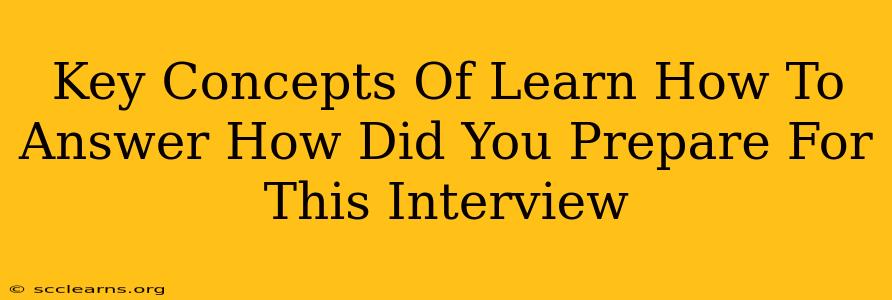Landing your dream job often hinges on acing the interview. And while your skills and experience are crucial, how you present your preparation speaks volumes about your initiative, professionalism, and genuine interest in the role. Knowing how to effectively answer the question, "How did you prepare for this interview?" is key. This post breaks down the key concepts to crafting a winning response.
Understanding the Interviewer's Intent
Before diving into crafting your response, it's vital to understand why the interviewer asks this question. They're not just curious about your study habits; they're assessing:
- Your level of interest: Did you just apply randomly, or did you genuinely research the company and role?
- Your proactive nature: Do you take initiative and plan ahead?
- Your understanding of the role and company: Do you understand the job requirements and company culture?
- Your organizational skills: Can you systematically approach tasks and manage your time effectively?
- Your attention to detail: Did you carefully review the job description and tailor your preparation?
Key Elements of a Strong Answer
A compelling answer needs to showcase these qualities. Here's a structured approach:
1. Research is Paramount: Showcasing Your Due Diligence
- Company Research: Mention specific aspects of the company that intrigued you. Did you read their latest press release? Analyze their market position? Understand their mission and values? Be specific. For example, "I spent time reviewing your recent sustainability initiatives, and I was particularly impressed by your commitment to..."
- Role-Specific Research: Demonstrate your understanding of the job description. Mention key responsibilities and how your skills align. For instance, "Based on the job description, I understand the role requires strong project management skills, and I've highlighted relevant examples from my previous experience in my resume."
- Industry Knowledge: Showcase your broader understanding of the industry. Have you read recent industry reports or followed key influencers? This proves your commitment to continuous learning and staying up-to-date. Example: "I've been following recent trends in the fintech industry, particularly regarding the increasing adoption of blockchain technology..."
2. Highlighting Your Skill Alignment and Preparation
- STAR Method: Use the STAR method (Situation, Task, Action, Result) to showcase relevant experiences that demonstrate the skills mentioned in the job description. Choose experiences that align with the company's values and the specific requirements of the role.
- Behavioral Questions Anticipation: Prepare for common behavioral interview questions like "Tell me about a time you failed" or "Describe a challenging situation you overcame." Anticipating these questions and formulating thoughtful answers shows preparedness.
- Questions for the Interviewer: Prepare insightful questions to ask the interviewer. This not only demonstrates your interest but also allows you to gather more information about the role and the company culture. Avoid questions easily answered through a quick Google search.
3. Showcase Your Enthusiasm and Passion
- Genuine Interest: Let your passion for the role and the company shine through. Your enthusiasm should be palpable.
- Confidence and Positivity: Project confidence in your abilities and your preparedness. A positive attitude goes a long way.
Example Answer Structure
Here's an example of how to structure your answer:
"To prepare for this interview, I started by thoroughly researching [Company Name] and its recent work in [Specific area]. I was particularly impressed by [Specific achievement or initiative]. I then carefully reviewed the job description and identified key skills, such as [Skill 1] and [Skill 2], which I've highlighted with specific examples in my resume. I also anticipated some common behavioral questions, preparing examples from my experience using the STAR method to illustrate my skills in [mention specific skills]. Finally, I prepared a few questions to ask you about [Specific area of interest related to the job or company] to gain a better understanding of the role and the team."
Conclusion: Preparation is Key to Success
Remember, preparing for an interview is not just about memorizing answers; it's about showcasing your genuine interest, understanding of the role, and commitment to success. By following these key concepts and tailoring your response to the specific job and company, you can confidently and effectively answer the question, "How did you prepare for this interview?" and significantly increase your chances of landing the job.

